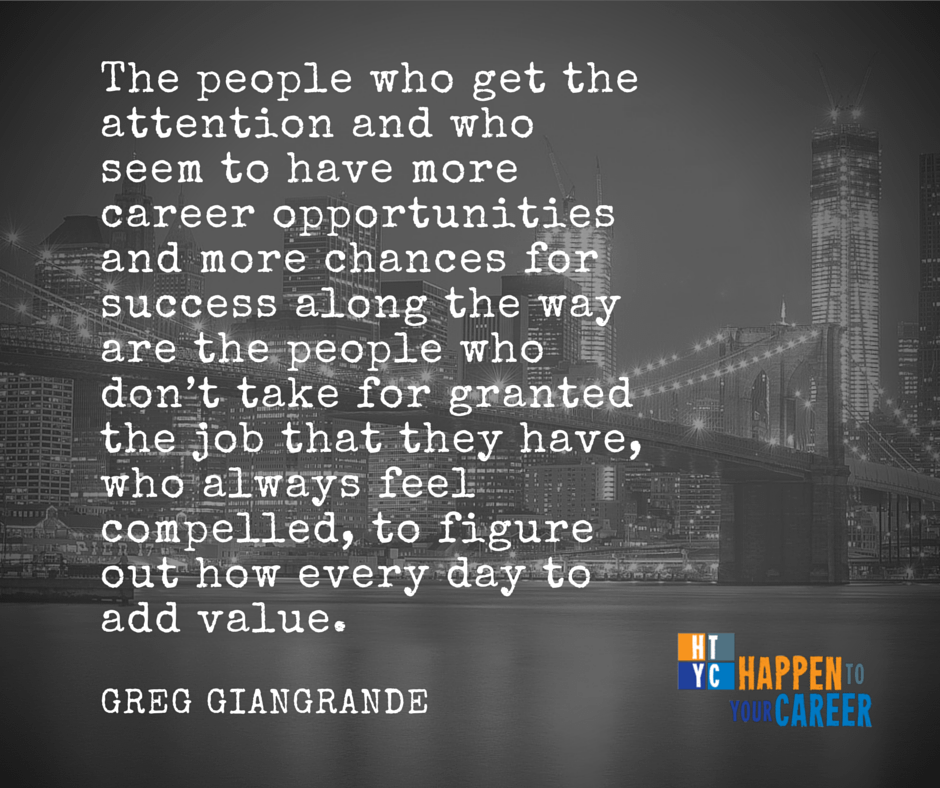ABOUT GREG GIANGRANDE
Greg Giangrande has been called “one of the most highly-regarded executives in his field” by Adweek. As Executive VP and Chief Human Resources Officer for Time Inc. he oversees HR globally for 8,000 employees. He’s held executive level HR positions at News Corporation, The Hearst Corporation and HR leadership positions at Conde Nast and Random House. Greg also writes a weekly advice column called “Go to Greg” for the NY Post and makes appearances on Good Day NY.
He’s also called all of the shots in his career, accepting only the opportunities that were aligned with what he calls his “True North.”
I never wanted to look back and regret not having spent enough time, or shortchanging my kids in that role. I could deal with regretting not having spent enough time in my professional career. But I don’t think I could deal with looking back and not having spent enough time raising my children.
Greg Giangrande
Greg’s anchor, his “True North” has always been his dedication to his family and keeping his career in balance with that has guided his decisions.
Greg believes that most people tend to overcomplicate their career decisions. What it comes down to is holding tight to what matters to you, then focusing on providing as much value as you can, learning where you can excel and then doubling down on that!
WHAT YOU WILL LEARN
- The importance of defining your “compass points” and your “True North” – finding direction in your career is simpler than you think!
- How to make yourself indispensable and attract more opportunity at work. *Hint: it’s all about providing value
- How to differentiate yourself from your peers.
- The difference between “activity” and “productivity” and how knowing that difference can help you skyrocket your career to the next level.
- What your “Reputation Index” is and how to manage it!
RELEVANT LINKS AND RESOURCES
Go to Greg – Greg’s New York Post weekly advice column
For more info on the value of being your authentic self:
HTYC 059 The Power of Being Yourself with Jenny Foss
For more information on understanding what matters to you and discovering the work that fits:
- The HTYC Mindset: Identify the Results You Want First!
- HTYC 049 The Magic of Motion with Ritchie Norton
- HTYC 054 Revolutionize Your Career with CK Bray
- HTYC 061 How to Approach Your Career Scientifically with Adarsh Pandit – ***mentioned in the episode***
- HTYC 062 Merging Identities as Part of Your Career Transition with Chris Wilson
- HTYC 064 Passion Project to Dream Job with Mark McClung
- HTYC 069 It’s Now or Never with Doc Kennedy
GET IN TOUCH WITH GREG!
Twitter: @GregGiangrande
LOVE THE SHOW? SUBSCRIBE TO THE HAPPEN TO YOUR CAREER PODCAST:
WE WOULD LOVE IT IF YOU WOULD LEAVE US A REVIEW! EACH REVIEW ALLOWS US TO REACH MORE FOLKS JUST LIKE YOU AND HELP THEM “HAPPEN” TO THEIR CAREERS!
WANT HELP FINDING THE WORK THAT FITS YOU?
Click to enroll in our FREE 8-day course!

Ready for Career Happiness?
What Career Fits You?
Finally figure out what you should be doing for work
Join our 8-day “Mini-Course” to figure it out. It’s free!
Featured Episodes
View all episodes
April 17, 2017
174: Add Value, Grow Your Career with Michael Bigelow
IT’S ONE OF THOSE THINGS THAT THE LIKABILITY AND CONNECTION CERTAINLY DO HELP. BUT IT’S ONE OF THOSE THINGS THAT I REALLY DO FEEL THAT IT’S BOTH WHO YOU KNOW AND HOW YOU’RE CONNECTED TO THEM, AS WELL AS WHAT YOU KNOW. MICHAEL BIGELOW Whether you’re looking to make a lateral job transition to a […]
Listen Now

January 21, 2019
267: 3 Creative and Strategic Ways to Show Your Strengths to Interviewers
Everywhere you look these days, you can find articles sharing why focusing on your strengths is more valuable than improving your weaknesses. Using your signature strengths in your role means you can be energized instead of drained, engaged instead of bored, and successful instead of struggling. When it comes down to it, working in your […]
Listen Now














